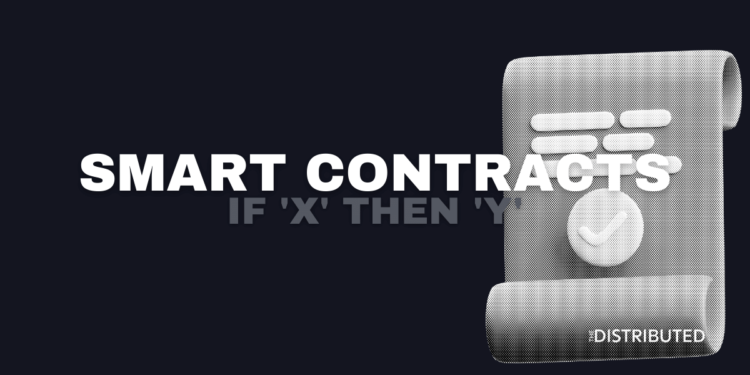What Are Smart Contracts?
A smart contract is a set of agreements stored within a database that runs when pre-determined conditions are met.
Smart contracts automate the execution of an agreement so both parties can verify the outcome through the open-source nature of the contract. This eliminates the need for trust within a centralized entity.
How Do Smart Contracts Work?
Smart contracts simply work by if ‘x’ then ‘y’ statements encoded within the agreement. Once the pre-determined conditions stated within the if ‘x’ are met and verified, the then ‘y’ outcome is executed automatically by a network of computers called nodes.
The data used by smart contracts to verify when conditions are met is often provided by the smart contract itself, other smart contracts or data sources known as oracles.
The term ‘Smart Contracts’ was first coined as a computerized transaction protocol that executes the terms of a contract by cryptographer Nick Szabo in 1994.[1]Nick Szabo – Smart Contracts
Szabo compared smart contracts to vending machines in their automated performance.[2]Nick Szabo – The idea of Smart Contracts You select your drink and then put $2 in the machine which once it verifies the money, will dispense your drink.
Are Smart Contracts Safe?
Smart contracts utilize various encryption and security tools to ensure their safety such as HTTPS and SSL certificates.[3]CoinMarketCap – What Is A Smart Contract? Third-party audits of the open-source code are another common security feature of smart contracts, although this does put reliance in a third-party.
Once a smart contract is launched onto a blockchain, it becomes immutable in the sense that it cannot be changed at all. Once the conditions are verified there is no way they can change.
Although this also does bring up the risk that if there was something wrong with the code it cannot be fixed. Hacks have run rampant in various dApps as hackers have been able to scope an open-source contract for potential weakness.
The open-source nature of smart contracts is very important as independent audits look for these potential errors prior to and after launch.
Applications Of Smart Contracts
Smart contracts are the basis of decentralized finance (DeFi) protocols and are used to power various decentralized applications (dApps). Dapps utilize various smart contracts to perform elaborate functions or provide a user-friendly interface over an existing smart contract.
Smart contracts have found their place so far within the DeFi ecosystem through the trading, investing, lending, and borrowing of funds.
There are countless proposed applications for smart contracts such as bonds, property rights, supply chains, and anywhere where an agreement is needed between 2 or more parties.
Can Smart Contracts Work Without Blockchain?
Smart contracts as defined by Szabo are a computerized transaction protocol that executes the terms of a contract, so if a database has a self-executing trigger then it may exist off-chain.
Although, existing off-chain can put control back into a centralized entity, which smart contracts aim to eliminate. Therefore, smart contracts are often utilized by the immutability of a blockchain.
Can Smart Contracts Be Legally Binding?
Havard law describes that as long as smart contracts follow the law around contractual agreements, they’re enforceable by the law, deeming that code-only smart contracts will be enforceable under a state’s law governing contracts.[4]Havard Law School – An Introduction to Smart Contracts and Their Potential and Inherent Limitations
References



